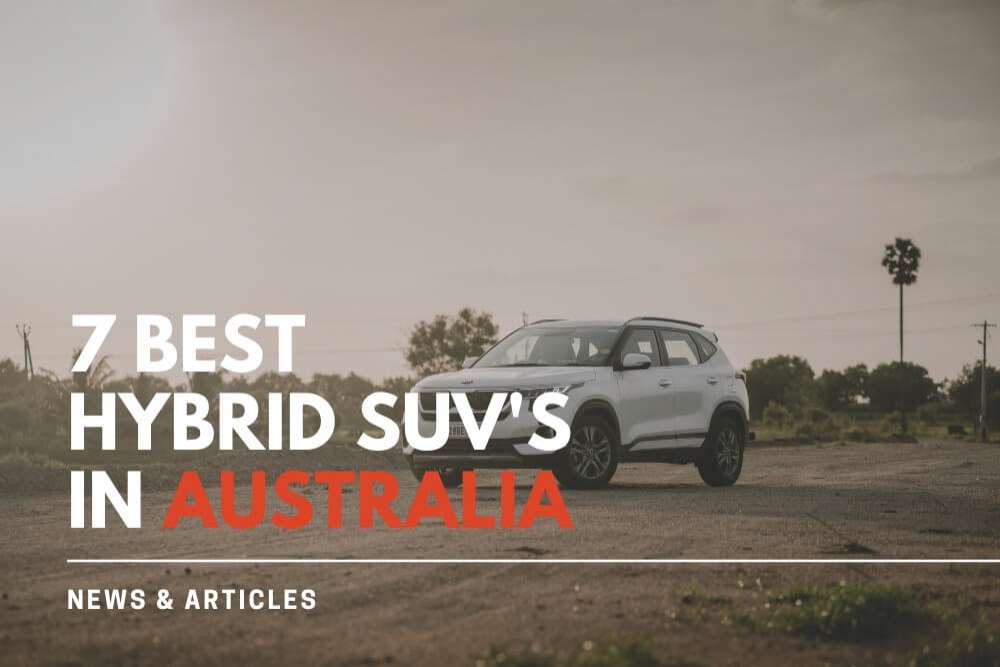
11 Best Hybrid SUV's Australia 2022
Growing emphasis on planet-friendly transport, coupled with rising fuel costs that make economical driving a priority, means that many motorists are considering purchasing a hybrid vehicle for their next new car.
Hybrids combine a traditional engine with an electric motor. There are several hybrid options:
- A full hybrid (the car can be powered by either an electric engine or a petrol engine).
- A partial hybrid (the car is powered by both engines, operating at different stages of the driving process).
- A plug-in hybrid SUV (the car can be powered purely by electricity, but needs to be recharged at a suitable charging point).
Here we take a look at seven of the best hybrid SUVs currently on the market. We consider the pros and cons of each, as we consider which drivers might benefit the most from each option.
1. Toyota RAV4
It's Australia's best-selling mid-size SUV, so from the outset, this should be one of the first options to look at if you're considering hybrid SUVs. Up-to-date tech, formidable performance, excellent safety features and a high level of comfort mean this car is always a winner.
In hybrid terms, the AWD option is particularly exciting - an additional generator to the two offered in the FWD format provides about 80% of the rear axle's torque - perfect for successfully traversing sand, mud or other unstable surfaces.
Pros
- AWD hybrid option offers plenty of grip.
- Very safe.
- Good level of tech.
- Fuel economy stands at 4.7L/100km
Cons
- Speed limited space-saving spare tyre.
- Some people don't like the raised front passenger seat.
Who should drive the RAV4?
It's a versatile vehicle that is likely to appeal to anyone wanting a good-quality SUV. The space-saving tyre may be a drawback if you regularly take longer trips, and the Rav4 isn't the cheapest. But it still stands as an excellent option for short trips and will generally serve you well for longer road trips. All that said, it's an SUV hybrid that holds its value and is unlikely to disappoint. Prices starting from $36,900 for the GX hybrid.
See Toyota RAV4 Listings On Cartopia
2. Kia Sportage
The Sportage is one of the Korean brands best selling models in Australia. And the long-awaited plug-in hybrid model aims to take things up a notch. Powered by a gutsy 1.6-litre petrol-turbo engine connected to a 44kW electric motor. The Sportage is powerful but remains one of the most fuel-efficient cars in its class.
Pros
Bold styling
Refined ride
Luxury interior
Cons
Limited supply
Lots of body roll
Steering feels soft
Climate controls confusing
Who should buy the Kia Sportage
The Sportage has bold styling, best-in-class fuel economy, a classy well-equipped cabin and a ride tuned specifically for Australian roads. And with prices starting at just $32,445, it’s pretty good value as well. Who should buy it? Well pretty much anyone in the market for a decent-size family SUV regardless of budget.
Find A Used Kia Sportage On Cartopia
3. Subaru Forester
Competitively priced and with a reputation for reliability, the Forester is a perennial favourite in the Australian car market. Unfortunately, reviewers don't rate the performance of its hybrid option particularly favourably, so buyers might be better advised to stick with the tried-and-tested petrol variants.
Pros
- Extremely safe, with a generous suite of autonomous safety features.
- Very reliable.
- Good value. It's competitively priced and you get a lot of gadgets and gizmos for your money.
Cons
- Driving performance is solid rather than stunning.
- Some people find a large number of switches and dials in the cabin irritating.
- Reviewers aren't particularly impressed by the hybrid variant.
Who should drive the Forester?
If you're shopping on a budget, the Forester could be right for you. Most SUV owners want a versatile workhorse that will work well for the school run, commuting, longer trips and the odd bit of off-roading with reasonable success. The Forester can do all that, as well as being very safe and offering great value.
View Subaru Forester Listings On Cartopia
4. Toyota Kluger
Bigger than the RAV4, the Kluger is a seven-seater hybrid SUV that's perfect for larger families. Intriguingly, it's also one of very few larger SUVs that come in a hybrid variant.
Pros
- Very spacious.
Cons
- Some reviewers feel that the materials used in the interior give a cheap, tacky vibe.
- Reviewers don't rate the tech highly, given the price of the Kluger.
- Reviewers prefer the standard petrol engine over the hybrid variant.
Who should drive the Kluger?
If you have a large family and want a hybrid SUV, the Kluger is the one for you! Although the tech isn't all that it could be, that's not necessarily a deal-breaker compared with the advantages the Kluger offers. If you want an attractive, tech-filled option, the CX-30 or the RAV4 may be more suitable. For drivers who need seven seats and a large luggage area, the Kluger works really well.
Go To Toyota Kluger Listings On Cartopia
5. Kia Sorento
The Kia Sorento has one of the most diverse powertrain lineups in Australia, but it’s the hybrid that’s the pick of the bunch. Powered by a 1.6-litre turbo-petrol engine paired with a 44kW electric motor and driven through a choice of FWD and AWD powertrains, the hybrid Sorento adds power and fuel efficiency to the very capable Sorento chassis.
Pros
More refined than the diesel version
The Interior is packed with high-tech
Fuel efficient powertrain especially in town
Cons
Only available in top-spec GT trim
Expensive servicing costs
Styling won’t be to everyone's taste
Limited supply from dealers
Related Reading: 10 Best PHEVs in Australia
Who should buy the Kia Sorento
The Sorento Hybrid is the ultimate family car. It comes with all the latest active safety equipment as standard. While inside there is plenty of room, it can comfortably seat 7 in three rows of seats. And the infotainment system is one of the best available. The Sorento is also classy looking, so it won’t look out of place on any driveway.
See Kia Sorento Listings On Cartopia
6. Toyota CH-R
Smaller than the RAV4, the CH-R benefits from striking exterior styling, a wealth of safety features and a 1.8l hybrid engine in the high-spec Koba variant. Like other Toyotas, it benefits from a good resale value, excellent reliability and a generous servicing package post-purchase.
Pros
- Good range of tech.
- Stylish interior that's a great place to spend time.
Cons
- The rear seats are cramped and light is limited compared with other SUVs.
- Some reviewers complain that the hybrid action is noisy.
- The extravagant styling makes rear visibility a challenge.
Who should buy the C-HR?
This is a compact SUV with limited rear space, so better for younger families. Some reviewers are less than enthusiastic about the driving experience, so if you like thrills behind the wheel, the CH-R may not be ideal. If you can afford it, it's probably worth paying the extra and splashing out on a RAV4.
7. Ford Escape
Benefiting from some upgrades for 2021, the Escape is Ford's answer to the likes of Toyota's RAV4 and the Mazda CX-30. The hybrid is due out for release towards the back end of 2021, so it will be interesting to see how it performs.
Pros
- Reviewers rave about the amount of tech you get, even in the base spec.
- A decent amount of space in the rear row and the boot size is good.
Cons
- Reviewers complain about a lack of comfort and seats that are a little too small.
Who should drive the Ford Escape
Decent sizing in the rear makes the Escape a good choice for families with teenagers, or people who carry adult passengers. Lack of comfort may be an issue on longer trips, however, so the Escape may be best for drivers that primarily need it for the school run or a short commute.
Related Reading: Best SUV's Australia
8. Mazda CX-30
It's not the cheapest in the hybrid SUV market, but the level of luxury the CX-30 offers may well be worth the price tag. Beautifully styled and with a very impressive array of tech, the combination of strong performance and good looks make the CX-30 an attractive choice.
Pros
- Beautiful styling both inside and out.
- Impressive tech and plenty of autonomous features.
Cons
- It's not particularly roomy in the back.
Who should drive the CX-30?
If you like a touch of luxury in your car, the Mazda is a great choice. The lack of rear space may mean it's better suited to drivers who rarely carry rear row passengers.
9. Kia Niro
Kia's first hybrid to hit the Australian market, the Niro is a plug-in option that's surprisingly affordable.
Pros
- Great value
- Quick charging
- Very comfortable to spend time in and to drive.
Cons
- Relatively limited range
- Small boot
Who should drive the Kia Niro?
The Niro is great for shorter commutes, the school run and nipping out to the shops - which is what most people use their car for 90% of the time! If you take longer trips, however, the lack of range and concerns about topping up the plug-in on the road mean the Niro isn't going to be the best choice.
10. Mazda MX-30
The MX-30 is a breath of fresh air in a market dominated by big SUVs. Positioned as a hip version of the family-orientated CX-30 on which it is based. The MX-30 is a mild hybrid, being powered by a 2.0-litre petrol engine paired with a tiny battery pack. This provides smooth power delivery, but fuel consumption is not much better than petrol versions.
Pros
Unique design
Excellent ride quality
Lots of safety tech
Cons
Mild-hybrid powertrain is not much more fuel efficient than petrol versions
The rear seats cramped for adults
The rear door design may be too quirky for some
Who should buy the Mazda MX-30
The quirky styling and compromised interior space mean the market for the MX-30 is limited. But it comes into its own for families with a couple of young kids, say under seven years old. The kids won’t be bothered by the limited rear head and leg room. And you’ll love the hip looks and dynamic handling.
11. Haval Jolion
The Haval Jolion Hybrid is powered by a 1.5-litre turbo-petrol engine connected to a single 140kW electric motor. Only one hybrid powertrain will be available at launch, a dual-clutch transmission driving the front wheels only. While the hybrid sits at the top of the range it still represents incredible value compared to the competition.
Pros
Competitive price
Spacious interior
Smooth hybrid drivetrain
Cons
Awaiting ANCAP test results
Non-reach adjustable steering
Some reliability issues on early models
Who should buy the Haval Jolion
As a car in its own right, the Jolion is a pretty decent mid-size SUV. It looks the part, comes well-equipped, has a spacious interior and has lots of safety equipment. There are some downsides like non-reach adjustable steering and an underwhelming infotainment system. But you may well be willing to overlook these when you see the price.
Once you've found the right car, the next step is sorting out car finance that actually works for your budget. Credit One is Australia's best-reviewed finance broker, with 3,000+ five-star Google reviews from customers who've been through the process. Check out Credit One reviews to see what people say, or head straight to the loan repayment calculator to see what the numbers look like.
